After taking photos of this tree every spring for several years now, I think I've figured out what it is. I figured it was some sort of magnolia, but the petals were too long and skinny. I think we're looking at a star magnolia, if I'm not mistaken, which is a type of tree and not a Southern Sci-Fi movie. At least that's what I think the tree is. As always, feel free to correct me if I've ID'd it wrong or anything.
Friday, March 18, 2011
star magnolia
After taking photos of this tree every spring for several years now, I think I've figured out what it is. I figured it was some sort of magnolia, but the petals were too long and skinny. I think we're looking at a star magnolia, if I'm not mistaken, which is a type of tree and not a Southern Sci-Fi movie. At least that's what I think the tree is. As always, feel free to correct me if I've ID'd it wrong or anything.
Thursday, March 17, 2011
spider, tanner springs
As seen on the wall-o-rusty-rails at Tanner Springs. I should point out that these were taken with macro gear and the spider is shown much larger than actual size. I'm not a spider expert, and I can't identify the beastie shown here. Feel free to leave a comment if you have any ideas about what it might be.
The Flogger
Today's adventure takes us up to industrial Northwest Portland, to a parking lot at NW 25th & Vaughn, near the big ESCO steel mill. The statue shown here is The Flogger, by Frederic Littman (who also created "Joy (Pioneer Woman)" and "Farewell to Orpheus", among other works). In the past I've generally said that his style is not really my cup of tea. I think I've used the word "lumpy" before. But this one actually works. Here the style seems to convey power and motion and determination. So it's possible that it's not the style that I don't care for, it's that the style and subject matter often don't mesh like they do here.
The company's website has a photo of the statue on their 'about' page. An Oregonian article profiles the company, and interviews one executive who started out at the company as a flogger. At this point you're probably wondering what a flogger is. In the steel industry, I mean. It seems that when you mold molten steel into a form, you often end up with extra steel stuck to your new metal part. A flogger uses a sledgehammer to break the extra metal off of the molded part. whereas a grinder does basically the same thing, except with a grinding machine. I'm going to go ahead and guess that "grinder" is the next step up on the career ladder if you start as a flogger. It's fortunate that a career ladder exists, at least; outside of the steel industry, the word "flogger" on a resume could prove to be a hindrance. I mean, unless you're interviewing for a professional S&M gig or a job with the CIA, not that there's much of a difference between the two anymore.
This post is a bit of an experiment in that these are camera phone photos. I'm not sure I've used phone photos here before except as a novelty, DSLR snob that I am. But these seemed to turn out OK, and uploading to Flickr instead of Twitpic seems to result in better image quality. The 40D is still obviously the high quality option, but it would be nice not to have to lug a big camera around quite so much. I say this as someone who turned mumble-mumble years old in December and whose lower back tried to seize up this morning as he jogged across the street to avoid traffic, while lugging -- you guessed it -- a big hefty camera bag.
Focus Fountain
Here's another of the swanky new fountains at CityCenter in Las Vegas. A press release about CityCenter fountains describes it:
Along the outer entrance circle rises Focus, an expansive, 270-foot-long curved water wall made of highly textured stone. Focus emphasizes the ever-changing, choreographed patterns that effortlessly sweep across the immense length and height of the wall. The all-enveloping water flow creates an ocean-like timbre that calms the area leading to ARIA’s lobby.
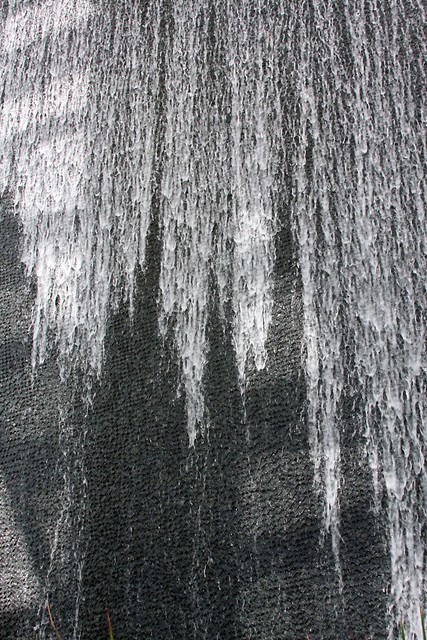
The water also cools the air outside the entrance, which is nice if you're standing outside in the 115 degree sun waiting for a taxi. So it's, I hesitate to use the word practical because this is Las Vegas, and we're talking about a huge water feature in the middle of the Mojave Desert, located at the entrance to a ten billion dollar casino complex with its own monorail system. So I think utilitarian is probably out too. Functional? Is that a better word? Is there a better word?
It's still nice on a hot day, whatever you want to call it.
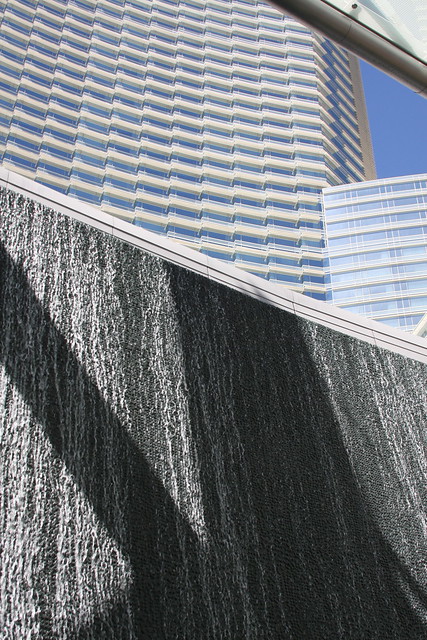
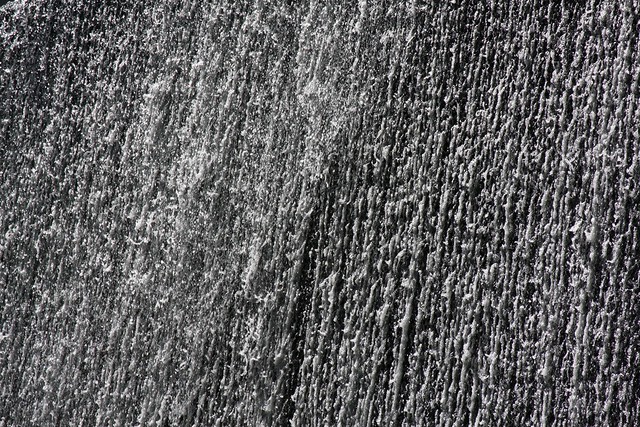
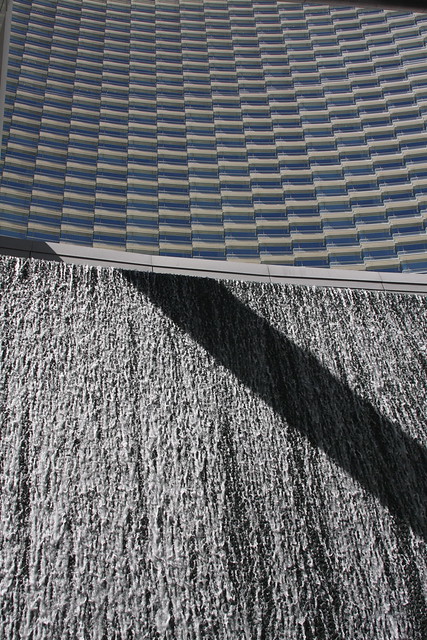
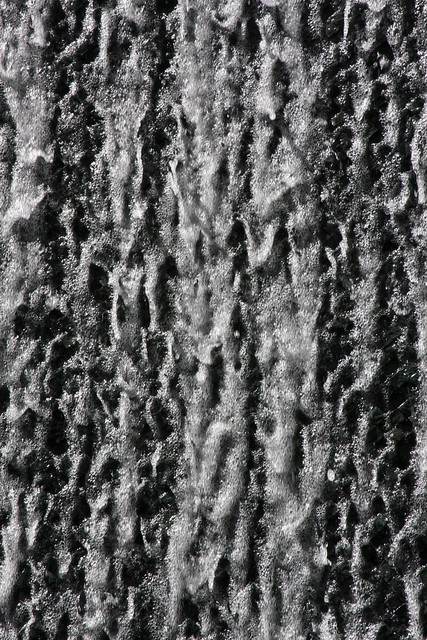
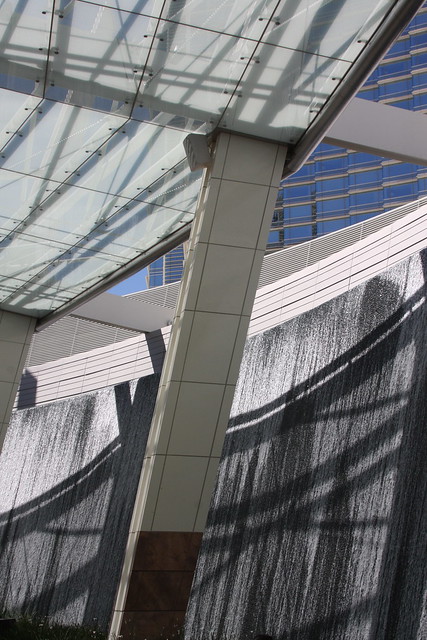
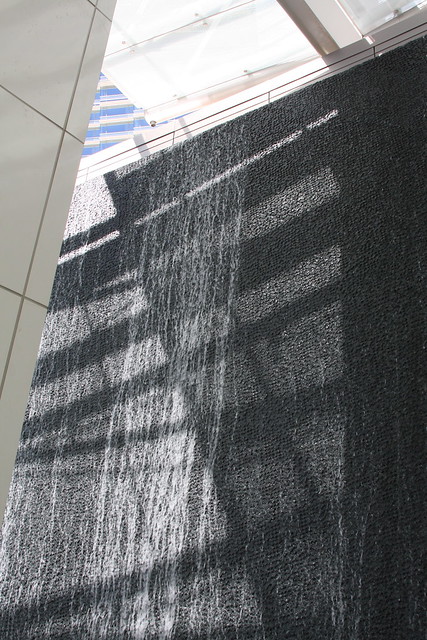
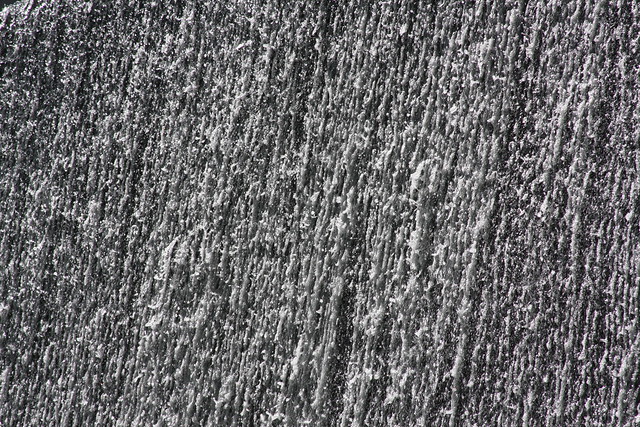
Ruckel Creek Falls expedition
View Larger Map
Today's adventure takes us out to obscure Ruckel Creek Falls in the Columbia River Gorge. Despite its obscurity it's quite easy to get to, once you know how. Ruckel Creek is far overshadowed by Eagle Creek and its many waterfalls just to the west, and this waterfall is really not all that big by Gorge standards. So it's overlooked, but not really unfairly overlooked. On the other hand, if you've been to all the better known waterfalls in the area and you're in the mood to track down one you've never seen before, this is one of the easier ones to do. And then you can tell people about the obscure waterfall you found and thus obtain valuable street cred, if you're into that.
The easiest way to get there is to park at Eagle Creek and walk east. There are two ways to do this: There's a flat asphalt bike path that begins next to the fish hatchery, which runs right next to I-84 for part of its length. The path is actually a repurposed & repaved segment of the old Gorge Highway, including the original bridge over Ruckel Creek circa 1914 or so. The path continues on to the town of Cascade Locks. So don't be totally surprised if you come across joggers or kids on bikes. Actually you could park in Cascade Locks and walk from there. That way would be a couple of miles longer and kind of monotonous most of the way, but you wouldn't need to buy a Forest Service day pass to park, and you could grab an ice cream cone at the East Wind on the way back. But I digress.
There's also a trail that winds around along the edge of the Eagle Creek campground for a bit before dumping you out on the aforementioned bike path. If you want this to feel a little more like a real hike, by all means take the trail, but it's really not all that scenic. If you're just trying to get to the waterfall, you might as well just take the bike path the whole way.
Finding the falls from the path ought to be easy, but for some reason there are no signs for the falls, and there's no official trail to the base. So I'm going to reveeal the semi-super, semi-secret trick for finding the falls.
First, as you're walking along the path, you'll come across a grassy meadow. If you come to the bridge over Ruckel Creek, you've gone too far. You can look down from the bridge and see the top of the falls, but to get to the base you'll need to backtrack a little. In any case, you're looking for an unexplained & unmarked turnout off the path that looks like this:
The above photo is pointing west, just past the turnout. The turnout is where you leave the path and go cross country for a bit. Which sounds vastly more adventurous than it really is. You just need to walk to the far end of the meadow until you come to the edge of the forest. There's no real trailhead here, but if you can find a spot that looks like the next photo, you've found one of the unofficial trails. There may be other entrances, and this one may not look the same when you visit.
Your best bet is to bring a GPS gadget along. You're looking for something in the vicinity of GPS coordinates 45.644810, -121.919522 (i.e. the green arrow on the embedded map). This is the location of the trail, not the location of the waterfall itself.
If you can find the sorta-trailhead, just follow the trail downhill from there. If you can't find it, don't worry. Once you're in the woods you ought to be able to hear the falls, so just walk toward the sound. The falls are going to be downhill and should be on your right. If you find the creek first, just follow it upstream. I don't have exact coordinates for the waterfall itself as I couldn't get a GPS fix there, but it really shouldn't be hard to find.
So there you are, in front of Ruckel Creek Falls in all its glory. If you're up for a real challenge, it seems this is not the only waterfall on Ruckel Creek. There are a number of others (the exact count varies) and several are significantly taller than this one. But getting to them involves bushwhacking through rough terrain. Which I may or may not get around to at some future date.
All of these other waterfalls are even more obscure than the one we're visiting here, and there's a lack of agreement on what their names ought to be. In particular, it's not clear whether this one is "Lower Ruckel Creek Falls", or whether that name applies to one further upstream leaving this one without a proper name. But I've also seen this one called simply "Ruckel Creek Falls". I'm going to go with that in the name of simplicity.
Elsewhere on the interwebs, you can find more info about the falls at Ash Creek Images and
Waterfalls Northwest, and lots of info about all the waterfalls on Ruckel Creek at Oregon Hikers Field Guide.
Thursday, March 10, 2011
reflected, congress center
More photos of buildings reflected in other buildings. This time the building doing the reflecting is downtown Portland's shiny but otherwise forgettable Congress Center tower. It's your standard-issue generic late 70s International Style office tower. In fact it's one of the tallest buildings in town, but quite honestly I'd never paid any attention at all to it until just now. It could be anywhere in the world, but unfortunately it ended up here.
I think this building illustrates what annoys the public so much about architects. They speak in the arcane jargon of their field, loudly declare each other (and themselves) the biggest geniuses in history and revolutionaries to boot, and then they turn around and build stuff like this. At least it's extremely shiny, so there's that. I suppose the shininess is to protect office workers from the excessive sunshine they'd be getting if the Congress Center had landed in Phoenix or Houston or Atlanta instead of here. Anyway, if you want to know more about it, there's more info at Emporis and SkyScraperPage.com.
There's one small distinguishing detail down at street level, a little Beaux Arts-ish gazebo over the stairs to a subterranean fondue parlor. The gazebo is a recycled bit of the previous building on the site, the historic Congress Hotel. Yes, go ahead and giggle at the name. I'm giggling too. We're all twelve years old here at this humble blog. Anyway, the link goes to an interesting piece at Portland Architecture about the old building. One commenter says of it "The stories the old-time reporters and copy editors would tell about it, though! You'd think half the illegitimate kids in Puddletown started with a gleam in someone's eye in the Congress bar.". So I'd imagine we're not the first to ever giggle like twelve year olds at the name.
The name is not explained in the article, but I have a theory. Or a notion, at any rate. There was once a Congress Hotel in Chicago as well, and like the Portland one it sported a restaurant called the Pompeiian Room. It could be a pure coincidence, but it's not completely absurd to wonder if the two were connected somehow, whether by ownership or by imitation. Unlike the one in Portland, the Chicago hotel still exists, as the (non-Pompeiian) Congress Plaza Hotel. Edna Ferber's 1917 short story "The Gay Old Dog" mentions the Chicago hotel while describing the tale's protagonist:
He bought a car. Naturally. A glittering affair; in color a bright blue, with pale-blue leather straps and a great deal of gold fittings, and special tires. Eva said it was the kind of thing a chorus girl would use, rather than an elderly businessman. You saw him driving about in it, red-faced and rather awkward at the wheel. You saw him, too, in the Pompeian Room at the Congress Hotel of a Saturday afternoon when roving-eyed matrons in mink coats are wont to congregate to sip pale-amber drinks. Actors grew to recognize the semibald head and the shining, round, good- natured face looming out at them from the dim well of the theater, and sometimes, in a musical show, they directed a quip at him, and he liked it. He could pick out the critics as they came down the aisle, and even had a nodding acquaintance with two of them.
And, in any case, the name of the Chicago hotel is no mystery at all, as it's bordered to the north by Congress Parkway. So if my notion is correct, the Congress Center is named, indirectly, after a street in downtown Chicago.